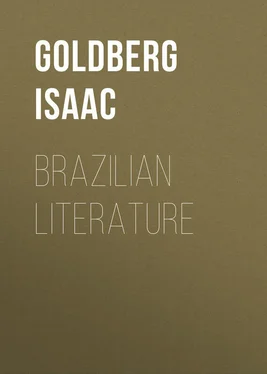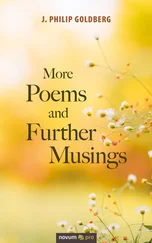Isaac Goldberg - Brazilian Literature
Здесь есть возможность читать онлайн «Isaac Goldberg - Brazilian Literature» — ознакомительный отрывок электронной книги совершенно бесплатно, а после прочтения отрывка купить полную версию. В некоторых случаях можно слушать аудио, скачать через торрент в формате fb2 и присутствует краткое содержание. Жанр: foreign_antique, foreign_prose, на английском языке. Описание произведения, (предисловие) а так же отзывы посетителей доступны на портале библиотеки ЛибКат.
- Название:Brazilian Literature
- Автор:
- Жанр:
- Год:неизвестен
- ISBN:нет данных
- Рейтинг книги:4 / 5. Голосов: 1
-
Избранное:Добавить в избранное
- Отзывы:
-
Ваша оценка:
- 80
- 1
- 2
- 3
- 4
- 5
Brazilian Literature: краткое содержание, описание и аннотация
Предлагаем к чтению аннотацию, описание, краткое содержание или предисловие (зависит от того, что написал сам автор книги «Brazilian Literature»). Если вы не нашли необходимую информацию о книге — напишите в комментариях, мы постараемся отыскать её.
Brazilian Literature — читать онлайн ознакомительный отрывок
Ниже представлен текст книги, разбитый по страницам. Система сохранения места последней прочитанной страницы, позволяет с удобством читать онлайн бесплатно книгу «Brazilian Literature», без необходимости каждый раз заново искать на чём Вы остановились. Поставьте закладку, и сможете в любой момент перейти на страницу, на которой закончили чтение.
Интервал:
Закладка:
The sporadic evidences of a nascent nativism become in the seventeenth century a conscious affirmation. The struggle against the Dutch in Pernambuco and the French in Maranhão compelled a union of the colonial forces and instilled a sort of Brazilian awareness. The economic situation becomes more firm, so that Romero may regard the entire century as the epoch of sugar, even as the succeeding century was to be one of gold, and the nineteenth, – as indeed the twentieth, – one of coffee. Agriculture even before the mines, – as Lima has pointed out, – was creating the fortune of the land. 37 37 Oliveira Lima, op. cit. pages 45-46, comments interestingly upon Brazil’s lack of a national poet during the sixteenth century. “Brazil did not possess, during the XVIth century a national poet who could express, with all the sincerity of his soul, the passion of the struggle undertaken by culture against nature… And this absence of a representative poet is evidenced throughout our literature, since, after all, the Indianism of the XIXth century was only a poetic convention grafted upon the trunk of the political break with the Portuguese fatherland… The fact is that the exploits of yesterday still await the singer who shall chant them. The Indians were idealized by a Romanticism in quest of elevated souls; the Africans found defenders who rose in audacious flight, but the brave pioneers of the conquest, men of epic stature, have not received even the same measure of sympathy.”
“The new society of the prosperous American colony is no longer essentially Portuguese; the mill-owners, well off and intelligent, forming a sort of rural aristocracy, similar to that of the feudal barons, are its best-read and most enlightened representatives. Around this tiny but powerful nucleus revolve all the political and economic affairs of the young nationality. Two profoundly serious factors also appear: the Brazilian family, perfectly constituted, and a hatred for the foreigner, nourished chiefly by religious fanaticism. The Lutheran, English or Flemish, was the common enemy … against whom all vengeance was sacred, all crime just and blessed.” 38 38 Ronald de Carvalho. Op. Cit. P. 87-88.
In Brazilian literature, the century belongs mainly to Bahia, which during the second half became a court in little, with its governor as the center of a luxurious entourage. Spanish influence, as represented in the all-conquering Góngora, vied with that of the poets of the Italian and Portuguese renaissance; Tasso, Lope de Vega, Gabriel de Castro and a host of others were much read and imitated. And in the background rose a rude civilization reared upon slavery and greed, providing rich material for the satirical shafts of Gregorio de Mattos Guerra, well-named by his contemporaries the “hell-mouth” of Bahia. In Antonio Vieira and Gregorio Mattos, Romero discovers the two antagonistic forces of the epoch: Vieira, the symbol of “Portuguese arrogance in action and vacuity in ideas”; Gregorio Mattos, the most perfect incarnation of the Brazilian spirit, “facetious, informal, ironic, sceptical, a precursor of the Bohemios .” As we shall presently note, opinion upon the “hell-mouth’s” Brazilianism is not unanimous.
The salient chroniclers and preachers of the century may be passed over in rapid review. At their head easily stands Frei Vicente do Salvador, (1564-1636/39) author of the Historia da Custodia do Brasil , which was not published until 1888, more than two hundred and sixty years after it was written (1627). His editor, Capistrano de Abreu, has pointed out his importance as a reagent against the dominant tendency of spiritual servitude to Portugal. “To him Brazil means more than a geographical expression; it is a historical and social term. The XVIIth century is the germination of this idea, as the XVIIIth is its ripening.” The Historia possesses, furthermore, a distinct importance for the study of folk lore. Manoel de Moraes (1586-1651) enjoys what might be called a cenotaphic renown as the author of a Historia da America that has never been found. Little more than names are Diogo Gomes Carneiro and Frei Christovão da Madre de Deus Luz.
Of far sterner stuff than his vagrant brother Gregorio was the preacher Eusebio de Mattos (1629-1692) who late in life left the Company of Jesus. There is little in his sermons to fascinate the modern mind or rejoice the soul, and one had rather err in the company of his bohemian brother. As Eusebio was dubbed, in the fashion of the day, a second Orpheus for his playing upon the harp and the viola, so Antonio de Sá (1620-1678) became the “Portuguese Chrysostom.” Yet little gold flowed in his speech, which fairly out-Góngora-ed Góngora himself. “His culture, like that of almost all the Jesuits was false; rhetorical rather than scientific, swollen rather than substantial.” 39 39 De Carvalho. Op. P. 96-97.
The poets of the century narrow down to two, of whom the first may be dismissed with scant ceremony. Manoel Botelho de Oliveira (1636-1711) was the first Brazilian poet to publish a book of verses. His Musica do Parnaso em quatro coros de rimas portuguezas, castelhanas, italianas e latinas, com seu descante comico reduzido em duas comedias was published at Lisbon in 1705. Yet for all this battery of tongues there is little in the book to commend it, and it would in all likelihood be all but forgotten by today were it not for the descriptive poem A Ilha da Maré , in which has been discovered, – as we have seen in our citation from Verissimo, – one of the earliest manifestations of nativism; Botelho de Oliveira’s Brazilianism, as appears from his preface, was a conscious attitude, and the patient, plodding cataloguing of the national fruit-garden precedes by a century the seventh canto of the epic Caramurú ; but for all this, there are in the three hundred and twenty-odd lines of the poem only some four verses with any claim to poetic illumination. The depths of bathetic prose are reached in a passage oft quoted by Brazilian writers; it reads like a seed catalogue:
Tenho explicado as fruitas e os legumes,
Que dão a Portugal muitos ciumes;
Tenho recopilado
O que o Brasil contém para invejado,
E para preferir a toda terra,
Em si perfeitos quatro AA encerra.
Tem o primeiro A, nos arvoredos
Sempre verdes aos olhos, sempre ledos;
Tem o segunda A nos ares puros,
Na temperie agradaveis e seguros;
Tem o terceiro A, nas aguas frias
Que refrescam o peito e são sadias,
O quarto A, no assucar deleitoso,
Que é do mundo o regalo mais mimoso;
São, pois, os quatro AA por singuares
Arvoredos , assucar , aguas , ares . 40 40 “I have explained the fruits and the vegetables that cause so much jealousy on Portugal’s part; I have listed those things for which Brazil may be envied. As title to preference over all the rest of the earth it enfolds four A’s. It has the first A in its arvoredos (trees), ever green and fair to gaze upon; it has the second A in its pure atmosphere ( ares ), so pleasant and certain in temperature; it has the third A in its cool waters ( aguas ), that refresh the throat and bring health; the fourth A in its delightful sugar ( assucar ), which is the fairest gift of all the world. The four A’s then, are arvoredos , assucar , aguas , ares .”
All of which bears almost the same relation to poetry as the grouping of the three B’s (Bach, Beethoven and Brahms) to musical criticism. Romero found the poet’s nationalism an external affair; “the pen wished to depict Brazil, but the soul belonged to Spanish or Portuguese cultism.” So, too, Carvalho, who would assign the genuine beginnings of Brazilian sentiment to Gregorio de Mattos.
Читать дальшеИнтервал:
Закладка:
Похожие книги на «Brazilian Literature»
Представляем Вашему вниманию похожие книги на «Brazilian Literature» списком для выбора. Мы отобрали схожую по названию и смыслу литературу в надежде предоставить читателям больше вариантов отыскать новые, интересные, ещё непрочитанные произведения.
Обсуждение, отзывы о книге «Brazilian Literature» и просто собственные мнения читателей. Оставьте ваши комментарии, напишите, что Вы думаете о произведении, его смысле или главных героях. Укажите что конкретно понравилось, а что нет, и почему Вы так считаете.












